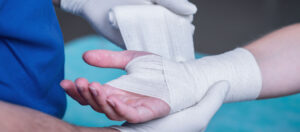By Deborah Jeanne Sergeant
 To an extent, medical professionals know how to care for wounds and ostomies; however, wound care also represents a medical specialty. Extra training and education in wound care and laceration repair can augment any medical professional’s resume and help segue into leadership roles.
To an extent, medical professionals know how to care for wounds and ostomies; however, wound care also represents a medical specialty. Extra training and education in wound care and laceration repair can augment any medical professional’s resume and help segue into leadership roles.
Sarah E. Clayson, who earned a doctorate in health sciences and master’s in health administration, is also a bachelor’s trained nurse. She serves as education coordinator and stroke coordinator for Finger Lakes Health. She said that many health systems have wound care nurses and wound care teams to assess and treat hard-to-heal wounds.
“When you look at nursing, there’s cardiac nurses and other specialties, but the skin is the largest organ of the body and we don’t talk about it enough,” Clayson said.
In May, she enrolled in the Cleveland Clinic’s online program for wound care, ostomy and continence, which takes about five months to complete. Some programs focus only on wound care; others include ostomy and continence because urine or feces remaining on skin for extended periods breaks down the skin. This is why medical supply such as ostomy belt from https://www.stealthbelt.com/ is really important and a must have.
Wound care specialists tend to serve many older adults, since their skin does not heal as quickly as younger people, and who are more likely to have conditions that raise their risk of pressure ulcers. Diabetics are also frequent patients of wound care specialists.
“If you have a diabetic who doesn’t manage diabetes, they may not feel there is a wound and they continue to get worse, which leads to amputation of a foot or limb,” Clayson said. “If it’s not identified and well-managed from the beginning, they can have significant issues.”
For these reasons, she felt it was important to bring specialized wound care to Geneva. Otherwise, the closest wound care centers are half an hour from the hospital. As more providers realize the benefits of wound care, the demand for the specialty will continue to increase.
Clayson added that home-based and nursing-home-based wound care is growing because of the expanding healthcare needs of the aging baby boomer generation.
“At larger centers, they look for board-certified wound care nurses,” Clayson said. “It absolutely will help your career.”
Nurses with a wound care certification cannot diagnose but discuss with providers their findings and “help bridge that gap with the nursing staff to deliver that care.”
The Cleveland Clinic’s wound care, ostomy and incontinence program costs $6,000. Other organization such as Wound Care Institute offer online classes.
“I never thought I would love wound care but it has brought me back to the bedside,” Clayson said. “I have a better appreciation for the overall care of patient, prevention of skin breakdown and improving their quality of life.”
David E. Balliette, program director of The Center for Wound Care & Hyperbaric Medicine at Clifton Springs Hospital & Clinic, said that nurses and doctors with wound care certifications are preferred for his organization.
“It teaches protocols, how to work with other primary care providers, as well as the modalities and advanced therapies we use,” he said. “When that patient is done with treatment, there’s definitely a connection where the patient is thankful for how they were treated. Their case manager is their coach for the healing processes.”
He added that the extra training may mean a higher paycheck, depending upon the organization, but the real perk is that working in wound care means regular work hours, without on-call or weekend work. Like Clayson, he thinks that wound care will continue to grow as a specialty area.
Tara Weedar, a registered nurse and clinical nurse manager at Clifton Springs Hospital, said that nurses can attend weeklong classes at Healogics in Jacksonville, Florida, to receive extra wound care treatment expertise. The organization also offers online courses. Rochester General Hospital offers wound care at Clifton Springs by outsourcing to Healogics.
Weedar said that completing coursework “would open more opportunities for them to provide services to their patients. Being in a wound care center, we have all the advanced modalities they can use. With the partnership with Healogic, our success rates outstrip any other facility.”
She said the care involves assessing wounds, understanding antimicrobial treatments, knowledge of devices for pressure ulcers and dressing wounds.
“When I look for staff, I look for someone with good bedside manner,” Weedar said. “Our patients come in weekly. Being able to connect with patients is important. We not only heal their wounds but we get to know people.”
She added that anyone can learn the technical aspects of wound care, “but the soft, bedside manner skills are not replaceable.”

